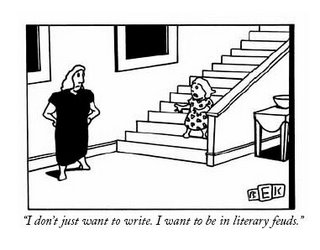DWIGHT GARNER:
"The sad truth about the book world is that it doesn’t need more yes-saying novelists and certainly no more yes-saying critics. We are drowning in them. What we need more of, now that newspaper book sections are shrinking and vanishing like glaciers, are excellent and authoritative and punishing critics — perceptive enough to single out the voices that matter for legitimate praise, abusive enough to remind us that not everyone gets, or deserves, a gold star."
(The New York Times, August 15 2012)
RACHEL DONADIO:
‘To some, the paucity of feuds is connected to the larger state of literary culture. “It’s not because we no longer have feuds,” said Fran Lebowitz, the writer. “It’s because we no longer have literature.” ’
(“Art of the Feud”, The New York Times, November 19 2006)
On her 10th death anniversary, I said: I have nothing new to write about her. I still haven't.
But I miss her.
Among other things, I miss her participation in Marathi literary feuds! What a passionate critic-cum-fighter she was- "excellent, authoritative and punishing".
I still remember the way she took on the late P L Deshpande ( पु ल देशपांडे) and Mr. Govind Talwalkar (गोविंद तळवलकर)- both then Sumo wrestlers on Maharashtra's middle class cultural mat- on the editorial pages of "Maharashtra Times" (महाराष्ट्र टाइम्स) in 1970's.
First my father read those articles aloud and laughed. Then I read them myself. I wish they never stopped feuding! [There is one puzzle still unsolved from those days. Ms. Bhagwat had accused Mr. Talwalkar on making a pun on the name of Amte (आमटे) in personal chats. I have never figured what it could be.]
Alas, now there are no big literary feuds in Marathi.
Literary feuds can end up in a real fight. Head butting for instance.
In India this year, we almost had one when Mr. Girish Karnad attacked Mr. V S Naipaul but sadly there was no retaliation from Mr. Naipaul and hence no fight and fun.
The sixth episode of the The Simpsons' eighteenth season "Moe'n'a Lisa" has Jonathan Franzen fighting with Michael Chabon.
 "Franzen and Chabon are hysterical. They get in heated fight, Franzen breaks a table over Chabon's head, Chabon accuses him of fighting like Anne Rice"
"Franzen and Chabon are hysterical. They get in heated fight, Franzen breaks a table over Chabon's head, Chabon accuses him of fighting like Anne Rice"Look at the following picture of Mr. Kaplan. Little girl is telling her mom: I don't just want to write. I want to be in literary feuds.
What an ambition! "I want to be in literary feuds" Like Durga Bhagwat, I may add!
 Artist : Bruce Eric Kaplan, The New Yorker, 27 June 1994
Artist : Bruce Eric Kaplan, The New Yorker, 27 June 1994